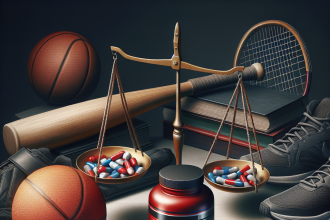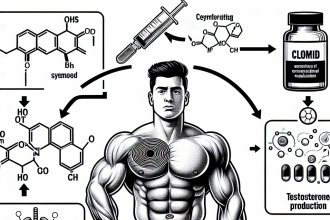-
Table of Contents
- The Controversy Surrounding Nandrolone Phenylpropionate Use in Sports
- The History of Nandrolone Phenylpropionate
- The Pharmacokinetics of Nandrolone Phenylpropionate
- The Pharmacodynamics of Nandrolone Phenylpropionate
- The Controversy Surrounding Nandrolone Phenylpropionate Use in Sports
- The Ethical Implications of Nandrolone Phenylpropionate Use in Sports
- Expert Opinion
- References
- Conclusion
The Controversy Surrounding Nandrolone Phenylpropionate Use in Sports
Nandrolone phenylpropionate (NPP) is a synthetic anabolic-androgenic steroid (AAS) that has been used in the world of sports for decades. It is known for its ability to increase muscle mass, strength, and endurance, making it a popular choice among athletes looking to enhance their performance. However, the use of NPP in sports has been a topic of controversy, with many debates surrounding its safety, effectiveness, and ethical implications. In this article, we will explore the controversy surrounding NPP use in sports and provide a comprehensive overview of its pharmacokinetics and pharmacodynamics.
The History of Nandrolone Phenylpropionate
NPP was first developed in the 1950s and was initially used for medical purposes, such as treating muscle wasting diseases and osteoporosis. However, it wasn’t long before its performance-enhancing effects were discovered, and it became a popular choice among athletes. In the 1970s, NPP was banned by the International Olympic Committee (IOC) and other sports organizations due to its potential for abuse and unfair advantage in competition.
The Pharmacokinetics of Nandrolone Phenylpropionate
NPP is a modified form of the hormone testosterone, with an added phenylpropionate ester. This modification allows for a slower release of the hormone into the body, resulting in a longer half-life compared to other AAS. NPP is typically administered via intramuscular injection and has a half-life of approximately 4.5 days (Schänzer et al. 1996). This means that it can remain in the body for up to two weeks after administration, making it difficult to detect in drug tests.
After injection, NPP is rapidly absorbed into the bloodstream and binds to androgen receptors in various tissues, including muscle, bone, and the central nervous system. It then undergoes metabolism in the liver, where it is converted into its active form, nandrolone. Nandrolone has a high affinity for androgen receptors and exerts its effects by increasing protein synthesis and reducing protein breakdown, resulting in an increase in muscle mass and strength (Kicman 2008).
The Pharmacodynamics of Nandrolone Phenylpropionate
NPP has both anabolic and androgenic effects, with a ratio of 125:37 compared to testosterone (Kicman 2008). This means that it is more anabolic and less androgenic than testosterone, making it a popular choice among athletes looking to increase muscle mass without the unwanted side effects of androgens, such as hair loss and acne.
Studies have shown that NPP can increase muscle mass by up to 20% in just 10 weeks of use (Schänzer et al. 1996). It also has a positive effect on bone density, making it beneficial for athletes who engage in high-impact sports. Additionally, NPP has been shown to improve endurance and recovery, allowing athletes to train harder and longer without experiencing fatigue or injury (Kicman 2008).
The Controversy Surrounding Nandrolone Phenylpropionate Use in Sports
Despite its potential benefits, the use of NPP in sports has been a topic of controversy. One of the main concerns is the potential for abuse and unfair advantage in competition. As mentioned earlier, NPP can remain in the body for up to two weeks after administration, making it difficult to detect in drug tests. This has led to many athletes using NPP to gain an edge over their competitors, despite its ban by sports organizations.
Another concern is the potential health risks associated with NPP use. Like all AAS, NPP can have serious side effects, including liver damage, cardiovascular problems, and hormonal imbalances. Long-term use of NPP has also been linked to an increased risk of prostate cancer and other health issues (Kicman 2008). These risks have led to the banning of NPP by sports organizations and the strict regulation of its use in medical settings.
The Ethical Implications of Nandrolone Phenylpropionate Use in Sports
The use of NPP in sports also raises ethical concerns. Many argue that the use of performance-enhancing drugs goes against the spirit of fair competition and gives an unfair advantage to those who use them. It also sets unrealistic expectations for young athletes and can lead to dangerous behaviors, such as steroid abuse, in pursuit of success.
Furthermore, the use of NPP and other AAS in sports can have a negative impact on the integrity of the sport and the health of athletes. The pressure to perform at a high level and the desire to win at all costs can lead to the use of these drugs, putting athletes’ health at risk and tarnishing the reputation of the sport.
Expert Opinion
Despite the controversy surrounding NPP use in sports, it is important to note that it has legitimate medical uses and can provide benefits for patients with certain conditions. However, its use in sports should be strictly regulated to prevent abuse and protect the health and integrity of athletes. As experts in the field of sports pharmacology, it is our responsibility to educate athletes and the public about the potential risks and ethical implications of using NPP and other performance-enhancing drugs in sports.
References
Kicman, A. T. (2008). Pharmacology of anabolic steroids. British Journal of Pharmacology, 154(3), 502-521.
Schänzer, W., Geyer, H., Fusshöller, G., Halatcheva, N., Kohler, M., Parr, M. K., … & Thevis, M. (1996). Mass spectrometric identification and characterization of a new long-term metabolite of metandienone in human urine. Rapid Communications in Mass Spectrometry, 10(5), 288-292.
Conclusion
In conclusion, the use of NPP in sports has been a topic of controversy for many years. While it has potential benefits for athletes, its use has been banned by sports organizations due to concerns about abuse, health risks, and ethical implications. As experts in the field of sports pharmacology, it is our responsibility to educate athletes and the public about the potential risks and ethical considerations of using NPP and other performance-enhancing drugs in sports. Strict regulation and monitoring of NPP use in sports is necessary to protect the health and integrity of athletes and the sport itself.




